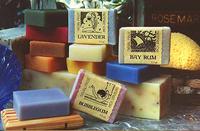 If you are wondering what in the world I am talking about, you should visit Natural Impulse, a web site specializing in homemade bath soaps and sundries.
If you are wondering what in the world I am talking about, you should visit Natural Impulse, a web site specializing in homemade bath soaps and sundries.According to Karen White, the owner and soap-maker, she and her husband invented those words, but they do come from a legitimate beginning. "Abluto" means a "washing" or "cleansing" in Latin, while "-phile" means "loving, fondness for, attraction to, affinity for" in Greek. As for Olfactomaniac, "olfacto" means "to smell" or "sense of smell" in Latin and "mania", of course, means "madness" or "enthusiasm" in Greek. Karen took those words and combined them to make something new, just like she combines oils and fragrances to make her soaps and bath salts. I had the pleasure of emailing her recently; in order to get an interview. I just had to find out how she makes those wonderful soaps of hers.
Karen says she made her first batch of homemade soaps in 1996, after quitting her job at the telephone company, and quickly became addicted. In 1997, she started selling her soaps, under the name Natural Impulse. Her soaps can be bought through her web site, craft shows and some small retail shops.
Are Homemade Soaps All Natural?
According to Karen, Natural Impulse’s soaps are made with vegetable oils such as olive oil, palm oil, avocado oils, as well as other vegetable oils. She tries to steer away from animal products, however she does admit that there is a tad bit of honey in the Oatmeal/Honey Scrub. Ummm, sounds good.
She also uses essential oils and some fragrance oils in her soaps and salts. Karen isn’t one to hide her ingredients; you can go to her web site and read about how she makes her soaps and how each ingredient affects the product. She says, "I like using natural products whenever I can, but sometimes it’s not possible. For example, there is no way to make a natural "Green Pear" soap, since there is no Green Pear essential oil." In those instances, she uses synthetic fragrance oils.
After doing my bit of research, (asking Karen) I found out that most soap found in the grocery store is made from "detergent" rather than soap. If you don’t know the difference and are confused, it breaks down to this: natural soaps contain "glycerin", which is a natural by-product of the soap-making process. Detergent bars contain chemicals that can dry out the skin.
How Long Does It Take To Make a Batch?
I asked Karen how long it takes her to make her soap and she confessed that it can take up to 3-4 hours for four batches, not including the prep work, such as the coffee for the "Amazing Kitchen Soap" and infusing the oils with herbs for her herbal soaps. It sort of goes like this:
You mix oils/fats with lye and water and get soap plus glycerin. Karen uses the "cold process" method in which the "melted oils are combined with cool lye water and stirred frequently and for a long time. You stir until you reach a "trace" – when the mixture begins to thicken.
The liquid soap is then poured into a mold and insulated for 24 hours.
Then the bars are unmolded and left to sit another day until they harden some and can be cut into smaller bars. Karen lets her soap cure for "at least three weeks" before they are ready for packaging and shipping. She says she uses a dehumidifier to help evaporate any excess water in the soap.
Sounds like a full time job all right. Very fascinating too.
I asked Karen how long her soap lasts and she said it depends on how it is used. Store-bought soaps are made to last longer and are harder. Homemade soaps tend to dissolve faster if left in water or where water can fall on it, such as in the shower. She says to drain your homemade soap and allow it to dry and then it will last a long time, sometimes longer than store-bought. To help you keep your soap dry; she has wooden soap drains for sale on her web site and they are adorable.
Soap Scents
Natural Impulse features many categories of soaps, such as Florals, Herbals, Southern Exposure, Kids, Scentual, and Retro. I, myself, ordered a couple of soaps to try out – Peach and Kudzu.
Yes, Kudzu.
Not aware that kudzu has a scent? Well, it does – a nice grapey kind of scent. I tried it in the shower (yes, I used my wooden soap drain) and was very pleased with the results. Not as much lather as I am used to, but that’s OK. Karen says that lather has nothing to do with cleansing. In order for homemade soaps to lather, you have to use a lot of coconut oil, which can be drying if used in large amounts. So "the trick is to use a percentage such that the majority of people will be pleased with both the lather and the feel of their skin afterwards."
My skin felt wonderfully soft and silky after using my kudzu bar. I can’t wait to try the peach.
And the magnolia…
And the gardenia…
And the peppermint…
And the lemon chiffon…
And the honeysuckle…
So go on over to Natural Impulse and order some homemade soaps and bath salts. Tell Karen that Southern Gal sent ‘ya!
Dana Sieben
www.southerngalgoesnorth.blogspot.com
